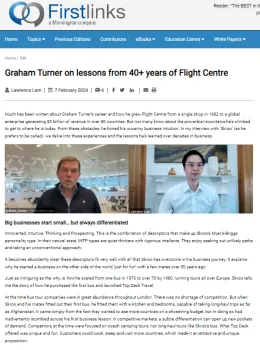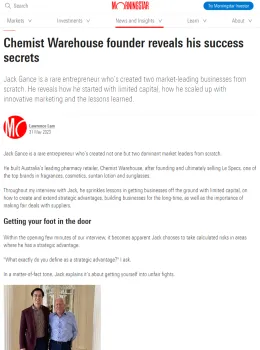First published in Firstlinks, 14 February 2024
This article is Part 3 of a three-part series about Graham Turner, Founder of Flight Centre.
***
Applying Evolutionary Psychology to Corporate Culture
Conventional corporate structure is made of a hierarchical, pyramid structure which Skroo does not ascribe to. The reason is because it slows decision-making, adds bureaucratic layers and disrupts the flow of customer feedback back up to management. The secret formula Flight Centre employed during their rapid pace was based on the theory of evolutionary psychology written by Professor Nigel Nicholson from London School of Economics. The design of an organisation is centred around teams of 5 to 8 people which hark back to how our hunter gatherer ancestors liked to live and work as a family. Typically 5 to 8 families make a village (an informal group that helps and works with each other), and 3 to 8 villages make a tribe. A tribe ideally consists of 80-150 people. Any larger unnecessary bureaucracy starts to creep in.
On organisational design: “You can take people from the Stone Age, but you can’t take the Stone Age out of people” – Graham Turner
This is how Skroo designed Flight Centre’s frontline teams – roughly 5 to 8 team members in any new shop, belonging to a village of 5 to 8 shops, which in turn linked to a tribe consisting of about 3 to 5 villages (15 to 25 shops). The ideal tribe had around 150 people. As Flight Centre grew beyond those limits, it had to inevitably embrace a level of bureaucracy which Skroo minimised by limiting it to a maximum of 3 or 4 levels – team level, followed by tribe level, then region level, then country level. Senior management should be a maximum of 4 or 5 levels away from frontline staff.
Organisational Structure In the Context of Evolutionary Psychology
To this day Flight Centre is structured this way and Skroo remains adamant the size of its board and senior management team should be no different than a family – a maximum of 5 to 8.

How To Acquire Companies
Skroo has overseen a 20 year track record of acquisitions and proudly stands by the fact he’s made plenty of mistakes. He is the first to admit a success rate of “50/50” is not impressive, but the courage of continuing to take risks is part of why Flight Centre has been successful. It is the reason that has enabled its longstanding leadership team to finetune its acquisition criteria and continue learning from mistakes.
For starters, he eschews “renovators” where on balance more time and capital is required than one estimates. He instead prefers ready-made targets that can already contribute immediately. The premium on acquiring these companies is worth it. Its biggest successes have come from acquisitions in adjacent markets. For example, Flight Centre was able to move into the corporate travel business through a string of acquisitions; it is now one of its largest business areas.
These days, Flight Centre has significant internal capabilities to grow by itself; it will only look to acquire where there are opportunities in niche markets where it does not already have exposure. That may be in new travel segments (such as leisure) or niche geographies where there are new growth opportunities. And this is the other key lesson Skroo has learnt – acquiring is not about empire building for the sake of organisational size; it is about building an advantage in a new niche.
The Makings of a Founder
To this day Skroo remains the CEO and retains a significant shareholding. Reflecting on his own journey, I ask him the ingredients which made him a successful founder and what separated him from others. In typical Skroo fashion, he responds analytically with a sense of realism: “getting my hands dirty on an apple orchard by the age of six set a foundation for understanding small business. It’s not a requirement for success, but certainly helped me learn the basics.”
As he developed, it became clear he was a builder – 2 buses was never enough. With a dry grin he points out he was motivated to pursue life outside the family’s apple orchard because “it was so boring” and of course he pays heed to a splash of luck which helped him survive the cash crisis early on. Somehow I suspect the element of luck is less than Skroo purports.
***
For our other articles on founders, search ‘Founder interview’ in our Knowledge Bank





